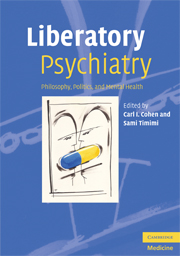Book contents
- Frontmatter
- Contents
- Contributors
- Acknowledgments
- Introduction
- 1 Working towards a liberatory psychiatry? Radicalizing the science of human psychology and behavior
- 2 Power, freedom, and mental health: a postpsychiatry perspective
- 3 Challenging risk: a critique of defensive practice
- 4 Democracy in psychiatry: or why psychiatry needs a new constitution
- 5 German critical psychology as emancipatory psychology
- 6 Psychopolitical validity in the helping professions: applications to research, interventions, case conceptualization, and therapy
- 7 Class exploitation and psychiatric disorders: from status syndrome to capitalist syndrome
- 8 Ecological, individual, ecological? Moving public health psychiatry into a new era
- 9 Children's mental health and the global market: an ecological analysis
- 10 Postcolonial psychiatry: the Empire strikes back? Or, the untapped promise of multiculturalism
- 11 A new psychiatry for a new world: postcolonialism, postmodernism, and the integration of premodern thought into psychiatry
- 12 Neoliberalism and biopsychiatry: a marriage of convenience
- 13 Psychoanalysis and social change: the Latin American experience
- 14 A new psychiatry?
- Index
- References
4 - Democracy in psychiatry: or why psychiatry needs a new constitution
Published online by Cambridge University Press: 25 August 2009
- Frontmatter
- Contents
- Contributors
- Acknowledgments
- Introduction
- 1 Working towards a liberatory psychiatry? Radicalizing the science of human psychology and behavior
- 2 Power, freedom, and mental health: a postpsychiatry perspective
- 3 Challenging risk: a critique of defensive practice
- 4 Democracy in psychiatry: or why psychiatry needs a new constitution
- 5 German critical psychology as emancipatory psychology
- 6 Psychopolitical validity in the helping professions: applications to research, interventions, case conceptualization, and therapy
- 7 Class exploitation and psychiatric disorders: from status syndrome to capitalist syndrome
- 8 Ecological, individual, ecological? Moving public health psychiatry into a new era
- 9 Children's mental health and the global market: an ecological analysis
- 10 Postcolonial psychiatry: the Empire strikes back? Or, the untapped promise of multiculturalism
- 11 A new psychiatry for a new world: postcolonialism, postmodernism, and the integration of premodern thought into psychiatry
- 12 Neoliberalism and biopsychiatry: a marriage of convenience
- 13 Psychoanalysis and social change: the Latin American experience
- 14 A new psychiatry?
- Index
- References
Summary
Nothing about us without us!!
(protest poster at a rally against American Psychiatric Association)Psychiatry's contemporary efforts to increase its liberatory potential are heir to a range of historically similar efforts. Carl Cohen and Sami Tamimi point out in their introduction to this book that the founding images of psychiatry start with Philip Pinel's liberatory gesture of unchaining the eighteenth-century Parisian insane. We can add to this liberatory gesture William Tuke's efforts to create a moral treatment, Sigmund Freud's efforts to discover and interpret unconscious conflicts, Jacques Lacan's efforts to keep Freud's work true to its potential, community psychiatry's efforts to spread psychiatric treatment to a broader public, Thomas Szasz's efforts to rid psychiatry of philosophical category mistakes, R. D. Laing's efforts to make space for the existential value of psychic suffering, and, even Robert Spitzer's efforts to make psychiatry more scientifically consistent. Throughout the history of psychiatry, in other words, we see a range of liberatory efforts. Each of these efforts has been designed to benefit the psychically different and those who suffer from psychic pain.
Despite the tremendous diversity of these liberatory efforts, they all have at least one thing in common. They all were created and designed by experts through a similar process. In each case, an expert, or small band of experts, undertook a critique of current psychiatric paradigms and institutions. After the critique, the expert imagined alternative psychiatric systems – which offered different and sometimes radically different approaches to psychiatry.
- Type
- Chapter
- Information
- Liberatory PsychiatryPhilosophy, Politics and Mental Health, pp. 73 - 88Publisher: Cambridge University PressPrint publication year: 2008

